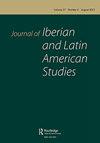西班牙政治犯大赦运动中的冷战争议(1961年)和西班牙流亡者在反弗朗哥主义政策中的领导地位受到侵蚀
IF 0.6
0 HUMANITIES, MULTIDISCIPLINARY
Journal of Iberian and Latin American Studies
Pub Date : 2021-01-02
DOI:10.1080/14701847.2021.1898154
引用次数: 0
摘要
随着20世纪50年代末产生的新的反对团体的活动日益增加,其主要成果是1962年在慕尼黑举行的会议,1961年举行了一场重要的运动,要求大赦西班牙政治犯。在这场国际抗议的伟大历史背后,发现了反佛朗哥力量之间的竞争和领导权斗争,以及关于此类行动战略方面的内部讨论,这在当时是不容易解开或察觉的。这篇文章记录了反对共产主义运动和激进的反共宣传活动的策略,在自由派流亡人士的进步圈子中遭到了越来越多的拒绝,在西班牙共和派知识分子在《纽约时报》上发表了一封抗议共产党人支持大赦活动的抗议书后,引发了一场重大争议。反对派自由派之间的内部争吵表明,与美国秘密冷战组织有联系的反共流亡领导人的政治计划日益缺乏活力,这给了西班牙内部及其新反对派团体发起的影响行动和政治动员的支持者理由。本文章由计算机程序翻译,如有差异,请以英文原文为准。
Cold war controversies in the pro-amnesty campaigns of the Spanish political prisoners (1961) and the erosion of Spanish exiles’ leadership in the anti-Francoist policies1
ABSTRACT Coinciding with a growing activity of the new opposition groups, produced in the end of the decade of the 1950s and whose main result was the meeting in 1962 in Munich, an important campaign was held in 1961 for the amnesty of the Spanish political prisoners. Behind the great history of this international protest were found, not easy to unravel or perceive at the time, rivalries and struggles for the leadership among the anti-Franco forces, as well as internal discussions about the strategic aspects of such actions. The article documents that the strategy of countering communist campaigns and propaganda activities from the radical anti-communist approach found growing rejection in progressive circles of liberal exile, generating an important controversy following a protest letter published by Republican Spanish intellectuals in The New York Times regarding pro-amnesty activities of the communists. Those internal quarrels among the liberal sectors of the opposition revealed the growing sterility of the political projects of the anticommunist exile leaders connected to the American covert cold war organisations, and gave reason to the supporters of an action of influence and political mobilization led from inside Spain and among its new opposition groups.
求助全文
通过发布文献求助,成功后即可免费获取论文全文。
去求助
来源期刊

Journal of Iberian and Latin American Studies
HUMANITIES, MULTIDISCIPLINARY-
CiteScore
0.40
自引率
33.30%
发文量
23
 求助内容:
求助内容: 应助结果提醒方式:
应助结果提醒方式:


